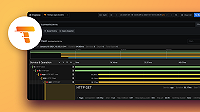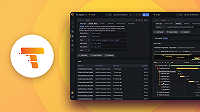Important: This documentation is about an older version. It's relevant only to the release noted, many of the features and functions have been updated or replaced. Please view the current version.
Monitor TempoStack instances
The configuration for monitoring TempoStack instances is exposed in the CR:
apiVersion: tempo.grafana.com/v1alpha1
kind: TempoStack
spec:
observability:
metrics:
createServiceMonitors: true
createPrometheusRules: true
tracing:
sampling_fraction: 1.0
jaeger_agent_endpoint: localhost:6831Configure distributed tracing of operands
All Tempo components as well as the Tempo Gateway support the export of traces in thrift_compact format.
Deploy OpenTelemetry collector sidecar
To deploy the OpenTelemetry collector, follow these steps:
- Install OpenTelemetry Operator into the cluster.
- Create an
OpenTelemetryCollectorCR that receives trace data in Jaeger Thrift format and exports data via OTLP to the desired trace backend. - Optional: Deploy tracing backend to store trace data.
apiVersion: opentelemetry.io/v1alpha1
kind: OpenTelemetryCollector
metadata:
name: sidecar-for-tempo
spec:
mode: sidecar
config: |
receivers:
jaeger:
protocols:
thrift_compact:
exporters:
otlp:
endpoint: <otlp-endpoint>:4317
tls:
insecure: true
service:
pipelines:
traces:
receivers: [jaeger]
exporters: [otlp]Send trace data to OpenTelemetry sidecar
Finally, create a TempoStack instance that sets jaeger_agent_endpoint to report trace data to the localhost.
The Tempo operator sets the OpenTelemetry inject annotation sidecar.opentelemetry.io/inject": "true to all TempoStack pods.
The OpenTelemetry Operator will recognize the annotation, and it will inject a sidecar into all TempoStack pods.
apiVersion: tempo.grafana.com/v1alpha1
kind: TempoStack
metadata:
name: simple-stack
spec:
template:
queryFrontend:
jaegerQuery:
enabled:
storage:
secret:
type: s3
name: minio-test
storageSize: 200M
observability:
tracing:
sampling_fraction: "1.0"
jaeger_agent_endpoint: localhost:6831

